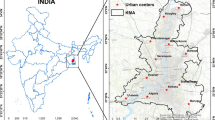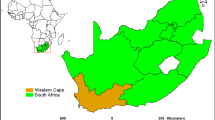Abstract
This study investigates spatial distribution and comparison of remote sensing ecological index (RSEI) variables in five smart cities in India: Bhopal, Bhubaneswar, Kochi, Jaipur, and New Delhi. The RSEI variables analysed include greenness, wetness, dryness, and heat. The study examines the correlation between these variables and their impact on the ecological conditions of the cities. The results reveal variations in the distribution of the RSEI variables among the cities, with Bhopal and New Delhi having higher percentage of high greenness areas compared to the other cities. Kochi stands out with the highest percentage of high wetness and greenness areas. The comparison of RSEI values indicates that Kochi and New Delhi have better ecological environments, while Jaipur lags behind with the lowest RSEI value. Bhopal and Bhubaneswar show moderate ecological conditions. The study also explores the relationship between ecological conditions and air and ground water quality. Kochi and New Delhi show acceptable air quality, while Bhopal and Bhubaneswar have moderate conditions, and Jaipur has unacceptable air quality. Water quality assessment reveals acceptable conditions in Bhopal, New Delhi, and Kochi, moderate conditions in Bhubaneswar, and very poor conditions in Jaipur. In conclusion, Kochi and New Delhi emerge as cities with better ecological, water, and air quality conditions. The presence of natural vegetation cover and planned green spaces contribute to their favourable environmental conditions. Bhopal and Bhubaneswar exhibit moderate ecological conditions, while Jaipur faces challenges due to rapid urbanization and inappropriate planning. These findings emphasise the significance of considering ecological factors in evaluating the overall environmental quality of smart cities.















Similar content being viewed by others
Data availability
All the data utilised in this research are available as per request.
References
Abdi H, Williams LJ (2010) Principal component analysis. Wiley Interdiscip Rev Comput Stat 2(4):433–459. https://doi.org/10.1002/WICS.101
Boori MS, Choudhary K, Paringer R, Kupriyanov A (2021) Spatiotemporal ecological vulnerability analysis with statistical correlation based on satellite remote sensing in Samara. Russ J Environ Manag 285:112138. https://doi.org/10.1016/J.JENVMAN.2021.112138
Cihlar J, Laurent SL, Dyer JA (1991) Relation between the normalized difference vegetation index and ecological variables. Remote Sens Environ 35(2–3):279–298. https://doi.org/10.1016/0034-4257(91)90018-2
Courchamp F, Dunne JA, Le Maho Y, May RM, Thébaud C, Hochberg ME (2015) Fundamental ecology is fundamental. Trends Ecol Evol 30(1):9–16. https://doi.org/10.1016/J.TREE.2014.11.005
CPCB (2022) Central Pollution Control Board. Retrieved from https://cpcb.nic.in/. Accessed 11 June 2022
Crist EP (1985) A TM tasseled cap equivalent transformation for reflectance factor data. Remote Sens Environ 17(3):301–306. https://doi.org/10.1016/0034-4257(85)90102-6
Dadhich AP, Goyal R, Dadhich PN (2018) Assessment of spatio-temporal variations in air quality of Jaipur city, Rajasthan, India. Egypt J Remote Sens Space Sci 21(2):173–181. https://doi.org/10.1016/J.EJRS.2017.04.002
Das T, Jana A, Mandal B, Sutradhar A (2021b) S patio-temporal pattern of land use and land cover and its effects on land surface temperature using remote sensing and GIS techniques: a case study of Bhubaneswar city, Eastern India (1991–2021). GeoJournal 2021:1–31. https://doi.org/10.1007/S10708-021-10541-Z
Das M, Das A, Pereira P (2023) Developing an integrated urban ecological efficiency framework for spatial ecological planning: a case on a tropical mega metropolitan area of the global south. Geosci Front 14(1):101489. https://doi.org/10.1016/j.gsf.2022.101489
Das Chatterjee N, Chatterjee S, Khan A (2016) Spatial modeling of urban sprawl around Greater Bhubaneswar city India. Model Earth Syst Environ 2(1):1–21. https://doi.org/10.1007/S40808-015-0065-7/TABLES/4
Das S, Shit PK, Patel PP (2021) Ecosystem services value assessment and forecasting using integrated machine learning algorithm and CA-Markov model: an empirical investigation of an Asian megacity. Geocarto Int. https://doi.org/10.1080/10106049.2021.2002424
EarthExplorer. Retrieved from https://earthexplorer.usgs.gov/. Accessed 4 May 2022
Forman RT (2016) Urban ecology principles: are urban ecology and natural area ecology really different? Landsc Ecol 31:1653–1662. https://doi.org/10.1007/s10980-016-0424-4
Ghosh S (2019) A city growth and land-use/land-cover change: a case study of Bhopal India. Model Earth Syst Environ 5(4):1569–1578. https://doi.org/10.1007/S40808-019-00605-Y
Guha S, Govil H (2021) An assessment on the relationship between land surface temperature and normalized difference vegetation index. Environ Dev Sustain 23(2):1944–1963. https://doi.org/10.1007/s10668-020-00657-6
Gupta N, Mathew A, Khandelwal S (2020) Spatio-temporal impact assessment of land use/land cover (LU-LC) change on land surface temperatures over Jaipur city in India. Int J Urban Sustain Dev 12(3):283–299. https://doi.org/10.1080/19463138.2020.1727908
Halder S, Das S, Basu S (2023) Vegetation condition, land surface temperature, and air quality in Shali River Basin, West Bengal, India. Remote Sens Earth Syst Sci. https://doi.org/10.1007/s41976-023-00083-y
Hu X, Xu H (2019) A new remote sensing index based on the pressure-state-response framework to assess regional ecological change. Environ Sci Pollut Res Int 26(6):5381–5393. https://doi.org/10.1007/S11356-018-3948-0
Ihlen V (2019) Landsat 8, L8 data users handbook, 5th edn. United States Geological Survey, Reston
Jain SL, Arya BC, Kumar A, Ghude SD, Kulkarni PS (2007) Observational study of surface ozone at New Delhi. India 26(16):3515–3524. https://doi.org/10.1080/01431160500076616
Jawaid MF, Pipralia S, Kumar A (2018) Review of environment responsiveness of building regulations in Jaipur. J Urban Manag 7(2):111–120. https://doi.org/10.1016/j.jum.2018.06.001
Jensen JR (2014) Remote sensing of the environment an earth resource perspective, 2nd edn. Pearson Education Limited, London
Jiang F, Zhang Y, Li J, Sun Z (2021) Research on remote sensing ecological environmental assessment method optimized by regional scale. Environ Sci Pollut Res Int 28(48):68174–68187. https://doi.org/10.1007/S11356-021-15262-X
Kanawade VP, Srivastava AK, Ram K, Asmi E, Vakkari V, Soni VK et al (2020) What caused severe air pollution episode of November 2016 in New Delhi? Atmos Environ 222:117125. https://doi.org/10.1016/j.atmosenv.2019.117125
Kauth RJ, Thomas GS (1976) The tasselled cap—A graphic description of the spectral-temporal development of agricultural crops as seen by Landsat. In: LARS Symposia, p 159
Kumar NM, Goel S, Mallick PK (2018) Smart cities in India: Features, policies, current status, and challenges.In: Proceedings international conference on technologies for smart city energy security and power: smart solutions for smart cities, ICSESP 2018, pp 1–4. https://doi.org/10.1109/ICSESP.2018.8376669
Kuriakose PN, Philip S (2021) City profile: Kochi, city region—Planning measures to make Kochi smart and creative. Cities 118:103307. https://doi.org/10.1016/J.CITIES.2021.103307
Liao W, Jiang W (2020) Evaluation of the spatiotemporal variations in the eco-environmental quality in China based on the remote sensing ecological index. Remote Sens 12(15):2462. https://doi.org/10.3390/RS12152462
Maity S, Das S, Pattanayak JM, Bera B, Shit PK (2022) Assessment of ecological environment quality in Kolkata urban agglomeration. India Urban Ecosyst 25(4):1137–1154. https://doi.org/10.1007/s11252-022-01220-z
Mann J (2012) Landsat, 1–5 multispectral scanner (mss) image assessment system (ias) radiometric algorithm description document. United States Geological Survey, Reston
Mathew A, Khandelwal S, Kaul N (2018) Investigating spatio-temporal surface urban heat island growth over Jaipur city using geospatial techniques. Sustain Cities Soc 40:484–500. https://doi.org/10.1016/J.SCS.2018.04.018
Panda BP, Prusty B, Panda B, Pradhan A, Parida SP (2021) Habitat heterogeneity influences avian feeding guild composition in urban landscapes: evidence from Bhubaneswar. India Ecol Process 10(1):1
Ramalho CE, Hobbs RJ (2012) Time for a change: dynamic urban ecology. Trends Ecol Evol 27(3):179–188. https://doi.org/10.1016/j.tree.2011.10.008
Raut SK, Raut PB (2013) Smart community participation for revitalization of urban green spaces over time: Case study New Delhi. In: Proceedings of the Real Corp
Rouse JWJ, Haas RH, Schell JA, Deering DW, Haas RH, Schell JA, Deering DW (1974) Monitoring vegetation systems in the Great Plains with ERTS. NASA 3rd ERTS-1 symposium, 1(A). Goddard Space Flight Center
Sarkar AA (2022) Remote-sensing-based analysis of relationship between urban heat island and land use/cover type in Bhubaneswar metropolitan. Area India. https://doi.org/10.1007/978-981-16-6966-8_3
Sowmya K, John CM, Shrivasthava NK (2014) Urban flood vulnerability zoning of Cochin City, southwest coast of India, using remote sensing and GIS. Nat Hazards 75(2):1271–1286. https://doi.org/10.1007/S11069-014-1372-4
Theodorou P (2022) The effects of urbanisation on ecological interactions. Curr Opin Insect Sci. https://doi.org/10.1016/j.cois.2022.100922
Tiwari A, Ahuja A, Vishwakarma BD, Jain K (2019) Groundwater potential zone (GWPZ) for urban development site suitability analysis in Bhopal, India. J Indian Soc Remote Sens 47(11):1793–1815. https://doi.org/10.1007/S12524-019-01027-0
Tiwari A, Mishra PK (2019) A study of urban-landscape characteristics of Bhopal City (India) in a geo-spatial environment. Urban B Ser. https://doi.org/10.1007/978-3-319-94932-1_15/COVER
Vyas AD, Mahale K, Ajmera D, Goyal R (2020) Optimum weights of environmental parameters in evaluating urban environmental sustainability index: Case study of Jaipur city. ISH J Hydraul Eng 28(1):62–71. https://doi.org/10.1080/09715010.2020.1830865
Wadwekar M, Wadwekar A (2018) Urbanisation and environment: A case of Bhopal. In: SSRN electronic journal international conference on urban sustainability: emerging trends, themes, concepts & practices (ICUS). https://doi.org/10.2139/ssrn.3198684
Wang Y (2021) Evaluation of lake wetland ecotourism resources based on remote sensing ecological index. Arab J Geosci. https://doi.org/10.1007/S12517-021-06892-Z
Wu J (2014) Urban ecology and sustainability: the state-of-the-science and future directions. Landsc Urban Plan 125:209–221. https://doi.org/10.1016/j.landurbplan.2014.01.018
Wu X, Zhang H (2021) Evaluation of ecological environmental quality and factor explanatory power analysis in western Chongqing. China Ecol Indic 132:108311. https://doi.org/10.1016/j.ecolind.2021.108311
Xu HQ (2013) A remote sensing index for assessment of regional ecological changes. China Environ Sci 33(5):889–897. https://doi.org/10.3969/j.issn.1000-6923.2013.05.019
Xu H, Wang M, Shi T, Guan H, Fang C, Lin Z (2018) Prediction of ecological effects of potential population and impervious surface increases using a remote sensing based ecological index (RSEI). Ecol Ind 93:730–740. https://doi.org/10.1016/J.ECOLIND.2018.05.055
Xu H, Wang Y, Guan H, Shi T, Hu X (2019) Detecting ecological changes with a remote sensing based ecological index (RSEI) produced time series and change vector analysis. Remote Sens 11(20):2345. https://doi.org/10.3390/RS11202345
Yue H, Liu Y, Li Y, Lu Y (2019) Eco-environmental quality assessment in china’s 35 major cities based on remote sensing ecological index. IEEE Access 7:51295–51311. https://doi.org/10.1109/ACCESS.2019.2911627
Zanchetta A, Bitelli G, Karnieli A (2016) Monitoring desertification by remote sensing using the tasselled cap transform for long-term change detection. Nat Hazards. https://doi.org/10.1007/S11069-016-2342-9
Zhang T, Yang R, Yang Y, Li L, Chen L (2021) Assessing the urban eco-environmental quality by the remote-sensing ecological index: application to Tianjin, North China. ISPRS Int J Geo Inf 10(7):475. https://doi.org/10.3390/IJGI10070475
Zhu D, Chen T, Wang Z, Niu R (2021) Detecting ecological spatial-temporal changes by Remote Sensing Ecological Index with local adaptability. J Environ Manag 299:113655. https://doi.org/10.1016/J.JENVMAN.2021.113655
Acknowledgments
The authors express gratitude to USGS Earth Explorer and CPCB for data sharing.
Author information
Authors and Affiliations
Corresponding author
Ethics declarations
Conflict of interest
The authors confirm the absence of any known competing personal or financial interests that could have appeared to impact the work reported in this paper.
Additional information
Editorial responsibility: S.Hussain.
Rights and permissions
Springer Nature or its licensor (e.g. a society or other partner) holds exclusive rights to this article under a publishing agreement with the author(s) or other rightsholder(s); author self-archiving of the accepted manuscript version of this article is solely governed by the terms of such publishing agreement and applicable law.
About this article
Cite this article
Halder, S., Bose, S. Ecological quality assessment of five smart cities in India: a remote sensing index-based analysis. Int. J. Environ. Sci. Technol. 21, 4101–4118 (2024). https://doi.org/10.1007/s13762-023-05270-4
Received:
Revised:
Accepted:
Published:
Issue Date:
DOI: https://doi.org/10.1007/s13762-023-05270-4




